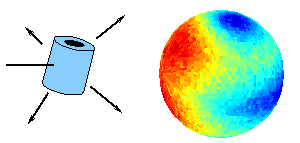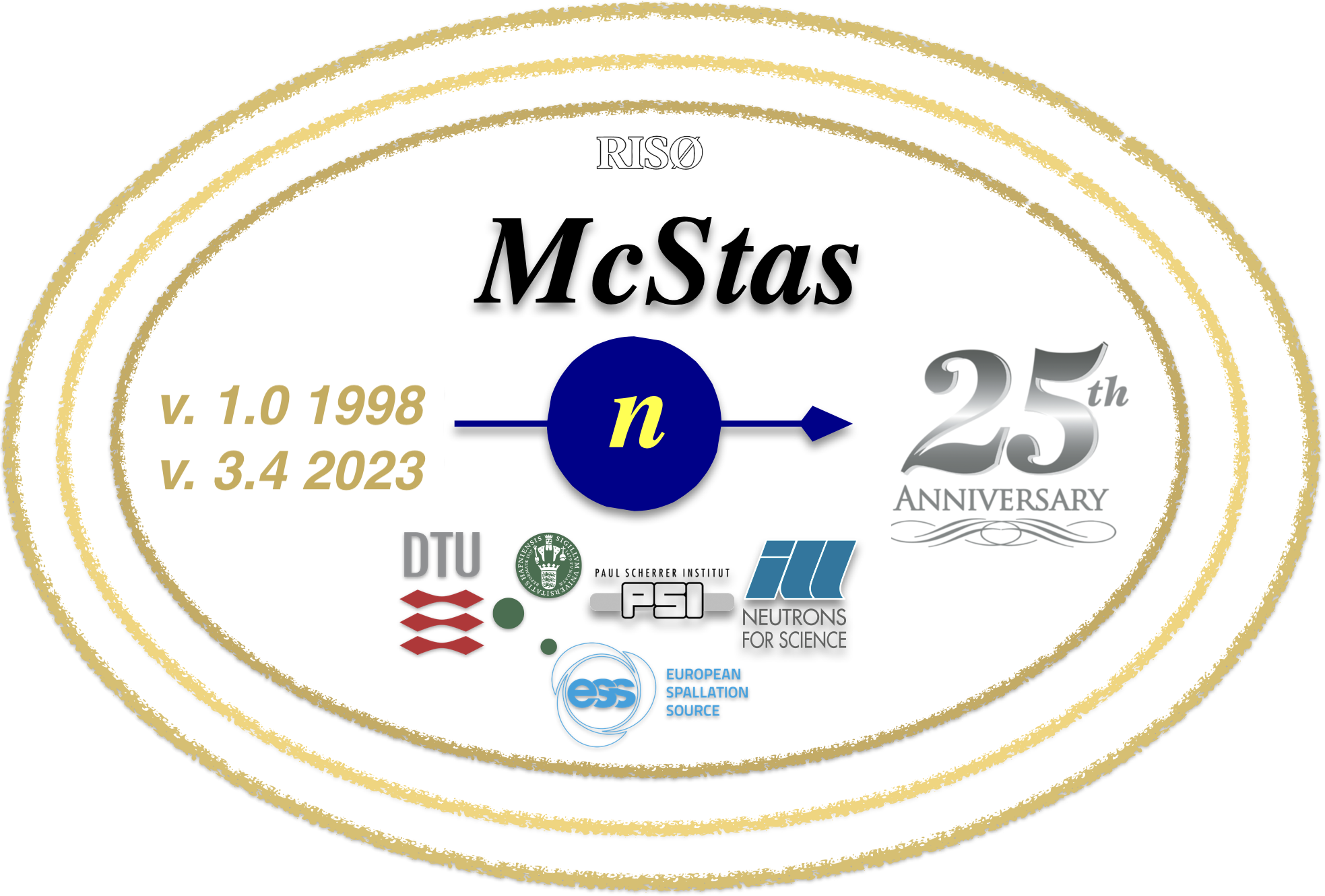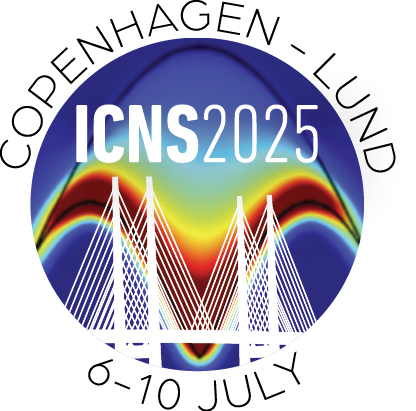 Simulated
scattering from a hollow-cylinder vanadium
sample.
Simulated
scattering from a hollow-cylinder vanadium
sample.

|
| The plot shows the intensity of scattered neutrons (red is
highest intensity). The sample is at the center of the sphere with the
neutron beam coming from the left. Clearly seen is the shadowing effect
of the sample causing a lower intensity opposite the beam. Also seen is
the effect of the non-symmetric geometry of the sample, causing lower intensity
directly above and to the side of the sample. |  |
Dear all,
McStas and McXtrace release 3.5.24 is now available - McStas installation
instructons on GitHub .
mcgui/mxgui Let configuration dialogue spawn your EDITOR to edit your local mccode_config.json
by @willend in https://github.com/mccode-dev/McCode/pull/1838 (available also by --edit-user-config from mcrun/mxrun)mcrun/mxrun: New switch --cogen to allow on-demand switch to non-standard code generator.
See also interoperability with mccode-antlr below
by @willend in https://github.com/mccode-dev/McCode/pull/1851mcrun/mxrun Solution for picking up code generator from PATH if not found where expected
by @willend in https://github.com/mccode-dev/McCode/pull/1840mcdisplay/mxdisplay instrument line parsing
by @g5t in https://github.com/mccode-dev/McCode/pull/1834mcdisplay/mxdisplay in Windows
from @LelandWH https://github.com/mccode-dev/McCode/issues/1853Vertical_bender: Add max iteration criterion for while loop (default 1000).
by @willend in https://github.com/mccode-dev/McCode/pull/1815NCrystal_sample: Remove possible out-of-bounds memory access
by @g5t in https://github.com/mccode-dev/McCode/pull/1821Elliptic_guide_gravity and Pol_mirror: Minor comp revisions, suppresses compilation warnings from clang
by @willend in https://github.com/mccode-dev/McCode/pull/1826SNS_ARCS.instr edits
by @willend in https://github.com/mccode-dev/McCode/pull/1838ISIS_IMAT.instr DEPENDENCY " @NEXUSFLAGS@ " added
by @willend in https://github.com/mccode-dev/McCode/pull/1839Union_master Adjustment of default parameter
by @willend in https://github.com/mccode-dev/McCode/pull/1840Union-related fixes and imports from DMSC school
by @willend in https://github.com/mccode-dev/McCode/pull/1841Elliptical_guide_gravity did not work in GROUPS as it always SCATTERS
by @mads-bertelsen in https://github.com/mccode-dev/McCode/pull/1843Monitor_nD on GPU: Adjustments for coherence between CPU and GPU particle lists
by @willend in https://github.com/mccode-dev/McCode/pull/1816cl.exe: Remove variable length array allocations for issue #1817
by @g5t in https://github.com/mccode-dev/McCode/pull/1819 and
https://github.com/mccode-dev/McCode/issues/1818 by @willend in https://github.com/mccode-dev/McCode/pull/1822mccode-antlrmccode-antlr is an alternative code-generator for McStas and McXtrace - a new development by @g5t and based on ANTLR instead of lex/yacc. The new tool is mainly written in python and thus has a lower barrier for changes in language syntax and code generation. The tool implementations mcstas-antlr and mcxtrace-antlr are thus a candidate implementations to potentially replace the classic mcstas and mcxtrace code generators in the future. Current status is thatmcstas-antlr is fully feature complete wrt. mcstas for CPU simulations and close to complete for GPU simulationsmcxtrace-antlr but basic functionality is in placemccode-antlr from conda-forge or via pipmcstas-antlr by --cogen=mcstas-antlr option in mcrunMCCOGEN field of mccode_config.json using the new Save/Edit configuration in mcgui-I${MCSTAS} to prefer ingredients fromyour local library)mcrun-antlr/mxrun-antlr tools provided directly by mccode-antlr.exeinstaller from mccode.org:
Please place the MCPL-related .bat files from the extras folder in e.g. c:\mcstas-3.5.24\bin to enable MCPL
(May require giving your user 'full access' permissions to the bin folder)Full Changelog: https://github.com/mccode-dev/McCode/compare/v3.5.16...v3.5.24
Dear all,
The ICNS2025 conference is taking place in Copenhagen and Lund this summer, and the abstract submission is closing January 15th - in one week.

Of special interest to McStas users:
A satellite event is being planned for July 11th, arranged by Mads Bertelsen, ESS and Peter Willendrup DTU/ESS.
We envision a one-day event with contributed talks on instrument simulation and its use, abstract submission will open soon:
Abstract:
Neutron scattering relies heavily on computer simulations of neutron scattering instrumentation to optimize their performance. These simulation tools are also evolving to be more relevant for a running facility, aiding in both preparation and analysis for individual experiments. It is even becoming possible to make better decisions during experiments by running simulations in parallel.
All the best and hope to see you this summer in Copenhagen,
Peter Willendrup
Previous news items: 2024, 2023, 2022, 2021,2020,2019, 2018, 2017, 2016, 2015, 2014, 2013, 2012, 2011, 2010, 2009, 2008, 2007, 2006, 2005, 2004, 2003, 2002, 2001, 2000, 1999, 1998.